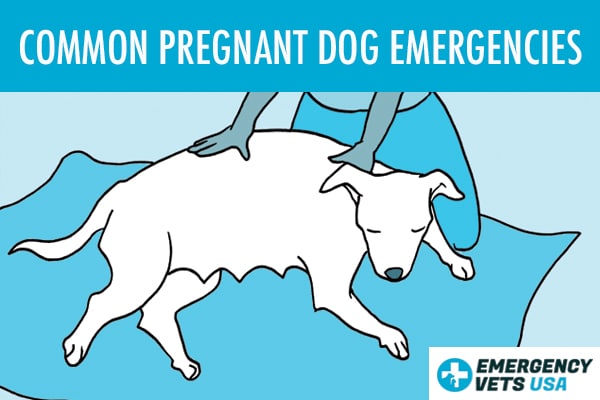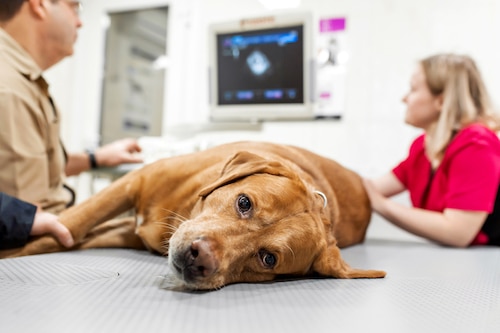Common Pregnant Dog Emergencies To Watch Out For
If you have a pregnant dog, you have a big responsibility, ready or not.
Many people that breed their dogs do so with the intention of selling the puppies.
In those cases, the owner generally ensures the dog has appropriate care with a veterinarian during the pregnancy.
On occasion, you may find yourself with an unplanned puppy pregnancy, and it is still your responsibility to ensure proper care of the mom to be.
Use your best judgment, when you think your pregnant dog needs medical care, don’t hesitate, your decision to seek professional help may just save a life.
Be sure to checkout the Dog Pregnancy Calendar so you know when to expect the new born puppies.
The hope is that all goes well during the gestation period, however that may not be the case.
You know your dog, and can determine if she is in pain.
At any time during the pregnancy, if you sense she is in pain or distress, see the veterinarian.
It’s not uncommon for a pregnant dog to be slightly uncomfortable, but she should not be in pain.

What Is A Normal Pregnant Dog Temperature?
Knowing the signs of when your puppy will deliver is very important.
This will allow you to watch out for any emergencies that could pop up during this time.
The normal temperature of your dog will sit in a range between 100 – 102.5 degrees Fahrenheit.
There are thermometers you can get that will help you gauge your dogs pregnant temperature.
You will want to monitor this temperature as the delivery date gets near.
With pregnant dogs, when the time comes they will start to pant heavily, this is normal and is nothing to be concerned about.
At this same time you will notice their temperature decline to 99 degrees or lower just before labor starts.
Keeping tabs of temperature may help easy your personal stress or anxiety.
About 24 hours after the temperature drops your puppy will ‘whelp’, deliver her new babies.
Most of the time dogs give birth easily and require no assistance.
Their natural instinct will kick in and they will do the majority of work.
When the first puppy is born it will come enclosed in its placental membrane. The mother, with her mouth will take it off, allowing the new puppy to breath.
If for some reason she does not, you may have to assist in removing it. This needs to happen within the first few minutes after birth.
When to Seek Emergency Care For Your Pregnant Dog

Bloody Or Smelly Discharge Right Before Labor
A warning sign that all is not right would be a vaginal discharge. It could be blood, or any discharge with a significant odor.
This would require prompt medical treatment for the safety of the female and the puppies.
Pregnant dogs have what is referred to as a mucus plug over their cervix to prevent bacteria from entering the uterus.
The plug is a white color and completely odorless.
During the pregnancy the plug may occasionally leak and produce a discharge.
If the discharge is minimal and odorless there is no need to panic.
However if the discharge has blood or an odor it can indicate an infection, or a dead puppy, and needs to be addressed by a professional right away.
No Delivery After 24 Hours From Temperature Drop
Once your dog’s temperature drops, that signifies the start of the labor process.
If you take the readings, and she has not begun active labor within 24 hours, it’s time to take her in to be checked.
While it is normal for the dog’s temperature to drop, this should happen only at the start of labor.
Any other variations in temperature can signify trouble.
Signs Of Contractions But Fails To Deliver
Intense contractions should last between 20-30 minutes.
If your dog is showing signs of contractions and fails to produce the first puppy, you need to seek emergency treatment.
There may be a chance she needs a cesarean to deliver the pups.
Some dogs may have weak muscles and be unable to contract a puppy.
Other problems can originate from a puppy not being turned the right way for a delivery, or even a puppy that is too large for mom to deliver vaginally.
If no puppy is born within 3-4 hours of mom passing discharge, either slightly brown or bloody, she may need assistance with delivery, which requires a veterinarian.
Again, if the mucus plug breaks and no puppy are born within a short period of time, the mom to be could be in distress.
The veterinarian may determine that a cesarean is necessary if the mucus plug is no longer present, and there is no sign of the first puppy.
Baby Puppy Cannot Pass Or Gets Stuck
Should you see a puppy that your dog cannot pass, head to the clinic.
Be sure to take any puppies that she already has passed as well.
Again, she may need assistance with the delivery.
In many cases, pregnancy checkups will reveal if the dog will be able to deliver normally.
On occasion, this may not be observed prior to delivery, and the dog may struggle to give birth.
If you see a puppy stuck partially out of the mom’s birth canal, it could signify a problem.
If she continues to attempt to push with no success, she will need emergency care.
Dogs with large heads, such as bulldogs, are often good candidates for planned cesarean births, your emergency veterinarian will determine the safest method for your dog and her puppies.
Throughout your dog’s pregnancy, you will most likely notice some changes in their eating and bathroom habits, this is normal and unless there are major changes, it should not be a concern.
Make sure your dog has a healthy diet, and clean water at all times, you may see an increase in her intake of water as well.
After the birth of the puppies it is a good idea to put mom’s food close or even in the area she is with her puppies, she will consume extra food after the birthing process.
You want to provide the best care possible care for your dog and her puppies, and the best care involves visits to the veterinarian throughout the pregnancy.
Follow doctor’s orders for your pup, and taker her for appointments as recommend by the doctor.
If your doctor is not available for emergency after-hours appointments, discuss an emergency plan of action if needed.
Most areas have emergency animal clinics; just make sure the address and phone number are readily available in case it is needed.

Leslie Brooks graduated from the University of Tennessee College of Veterinary Medicine in 2012. After graduation she moved to Indianapolis to do an intensive one-year internship at a specialty practice and then began working as a small animal general practitioner. She ran her own house call practice for three years, visiting pets in people’s homes. Currently, she works part time in clinical practice and volunteering her free time to serve pets of the homeless. Read more about us here.
